“(H)ope is rare in Myanmar now”, said Volker Türk, the UN’s new point-man UN High Commissioner for Human Rights during the Interactive Dialogue on Myanmar at the 52nd Session of the UN Human Rights Council held in Geneva on 6 March.

Embed from “Myanmar: High Commissioner details severe violations amid shocking violence”, the UN website dated 6 March, 2023
Reading this statement, it’s worth remembering American presidents’ emotive spins in other contexts such as “freedom is on the march” or “civilization is under attack”.
While highly quotable, such professionally crafted soundbites of sensationalism, tailored for mass media consumption, as evidenced in the UN top bureaucrat’s emotive portrayal – contain little or no intellectual value in terms of understanding the “complex” nature of the civil war in my country of birth. Nor did Türk’s lawyerly oral presentation of bare facts – without analysis, context or institutional memory – offer any meaningful insights or contain a serious analysis as to how Myanmar got here. (I do appreciate the statistics of infrastructure destruction, air strikes, executions and murders, imprisonment – all compiled by local Myanmar researchers – being relayed in Geneva and lent credence by the UN Human Rights chief.)
As to be expected of a UN careerist, Türk, who wrote his PhD in law on UN’s refugee watchdog, chose not to call attention to how the United Nations has for decades have been failing the people of Myanmar since the UN General Assembly mandated the position of the United Nations’ (voluntary) investigator on the situation of human rights in Myanmar three decades ago.
Antonia Guterres, the then head of the UN High Commission for Refugees (UNHCR) was personally told by the then President (and ex-general) Thein Sein that Myanmar’s “reformist” military government intended to either ship all Rohingyas – estimated at 2.5 million – outside Myanmar or inter them in camps as illegal and unwelcome migrants in their face-to-face meeting in Myanmar capital in July 2012. Guterres chose not to blow the whistle for ethnic cleansing, Milosevic-style. (See Democratic Voice of Burma, 13 July 2012).
Never mind his failing to sound the early warnings of a genocide by a sizeable UN member state.
Five years later, in his capacity as the UN Secretary General, the same Guterres did nothing to hold to account his own senior staff when the credible news of the UN Resident Coordinator, Renata Lok-Dessallien, deliberately suppressing field reports from the killing fields of Rohingya in Western Myanmar (The Guardian, 17 October 2017).
She thought it more important for the United Nations in Myanmar to have cordial relations, and coveted access to Myanmar’s genocide perpetrating reformists than documenting and relaying the documented information to New York headquarters about the unfolding atrocity crimes perpetrated in the paddy fields and riverine plains of Rakhine state, an hour flight away from her fancy Resident Coordinator’s Office in Yangon! (Typically, the UN and EU, as well as foreign governments such as Australia rent expensive villas from Myanmar military leaders and former leaders as offices and residences for their Conradian outposts in Myanmar.)
As a matter of fact, from the Security Council (UNSC) (and its inactions) to the UN’s technical agencies which collaborate with the murderous Myanmar military regimes, the United Nations have contributed to my old country’s decades of human rights hell.
From Kofi Annan (who as head of UN Peacekeeping Ops in NYC shelved the “genocide cable” from Kigali, Rwanda) to Antonio Guterres, the United Nations bureaucracy appear to typically promote – as opposed to hold to account its senior bureaucrats for their failure to discharge their moral and professional responsibility to warn the organization – and “the international community” – of grave international crimes such as genocides. (See Genocide: Why We Let it Happen | Full Panel Discussion | Oxford Union. February 2018, YouTube.)
Besides the utter and complete failure of the august body of the UNSC to act – even in the face of the unfolding Rohingya genocide, there are no shortages on Google of pathetic images and sordid news of career bureaucrats of the UN Development Programme, United Nations Children’s Fund, the country office of the UN Resident Coordinator in Myanmar, the World Health Organization, the United Nations High Commissioner for Refugees signing memorandums of understanding (MOUs) with the known perpetrators of Rohingya genocide and the whitewashers of Myanmar military’s gravest crimes in international law.
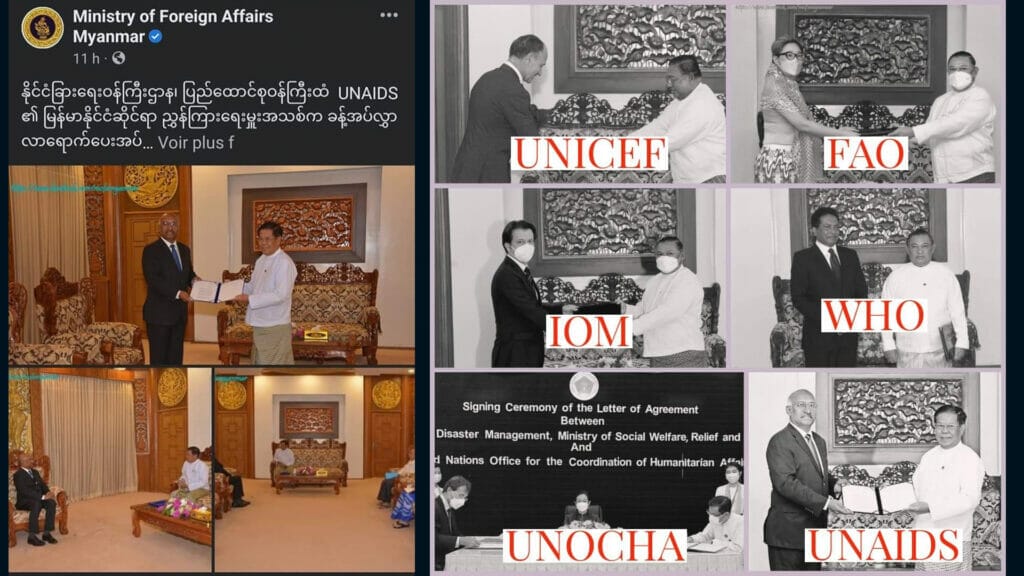
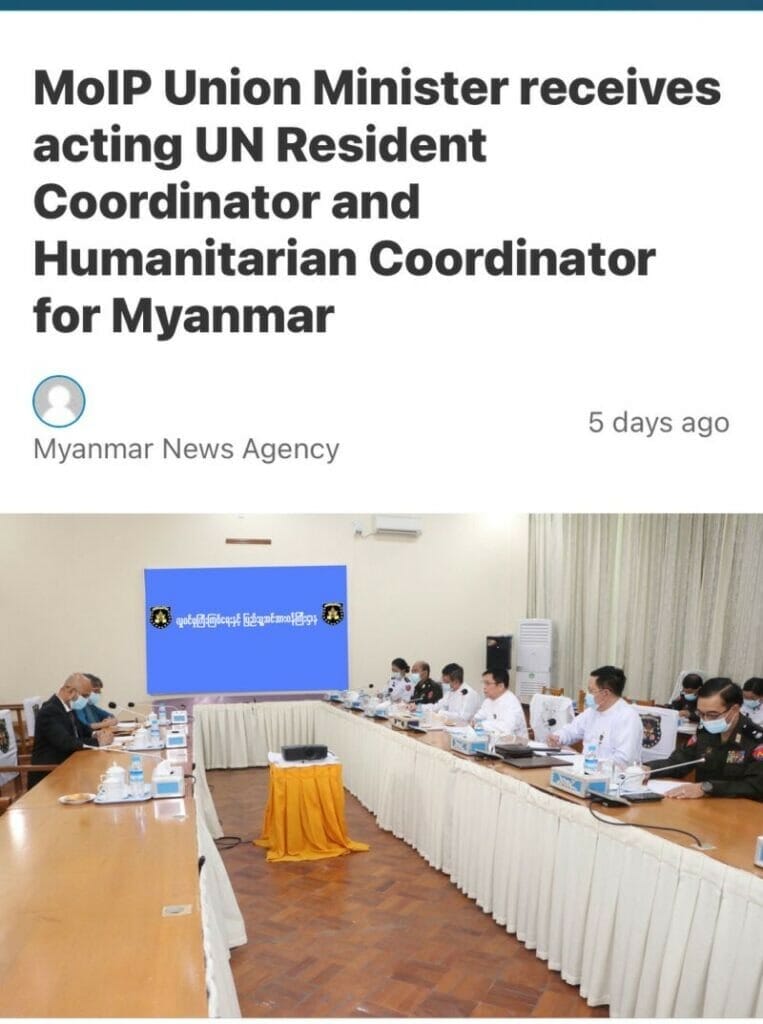
Not only does the in-country UNICEF in Myanmar or the New York headquarters have a high level of tolerance towards atrocity crimes in Myanmar, but also the UN bureaucrats obviously don’t think there’s anything immoral or condemnable in accepting and appeasing the Burmese functionaries of the military regime whose leaders are ICC-bound. In September, Myanmar Air Force gunship helicopters fired into a local school, housed in a Buddhist monastery, having killed scores of school children inside. And beyond a brief statement, it has been business as usual for UNICEF in Myanmar.
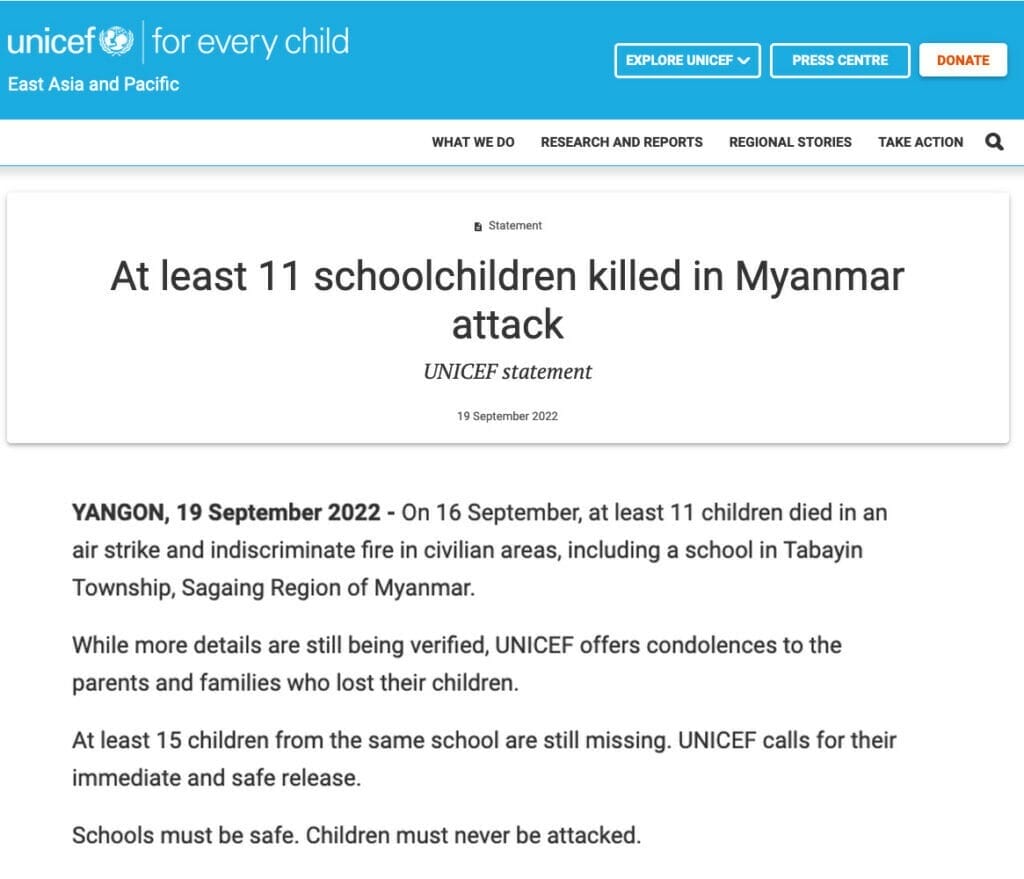
At least 11 schoolchildren killed in Myanmar attack (unicef.org)
On the same day I was hosting a 60-minute FORSEA dialogue with David Eubank, the American founder and leader of the Free Burma Rangers (FBR), a faith-based humanitarian relief service movement which draws hope, compassion and strength from the very oppressed communities which have been objects of UN human rights discourses and empty talk shops or shows. FBR founder is a former US Army Special Forces and a Green Beret (a highly elite crop of US army fighters) and a devout Christian practitioner who lives his faith through his service movement anchored in love and universal fellowship of man and woman (of all faiths or anti-faiths).
Like Commissioner Türk in Geneva, Eubank is someone who too feels Myanmar is “a country close to my/his heart”. At some point in our conversation, the battle-seasoned US army veteran was overwhelmed by his emotions over what he has witnessed first-hand; the impact of egregious human rights violations on Myanmar peoples and communities, those people he has come to be organically linked.
Unlike Türk who, as a UN careerist, presumably interacts with representatives of the Myanmar state, in Yangon, Mandalay or the fortified capital Nawpyidaw, Eubank goes in and out of the war zones of Myanmar.
Before the dialogue, a mutual friend sent me a picture of Eubank with the two severed heads of the Karenni minority resistance fighters – already decomposed as the poor souls were beheaded by Myanmar military troops 6 months ago – which he retrieved from a 10-meter-deep village well, several hundred meters away from a Myanmar army garrison unit.
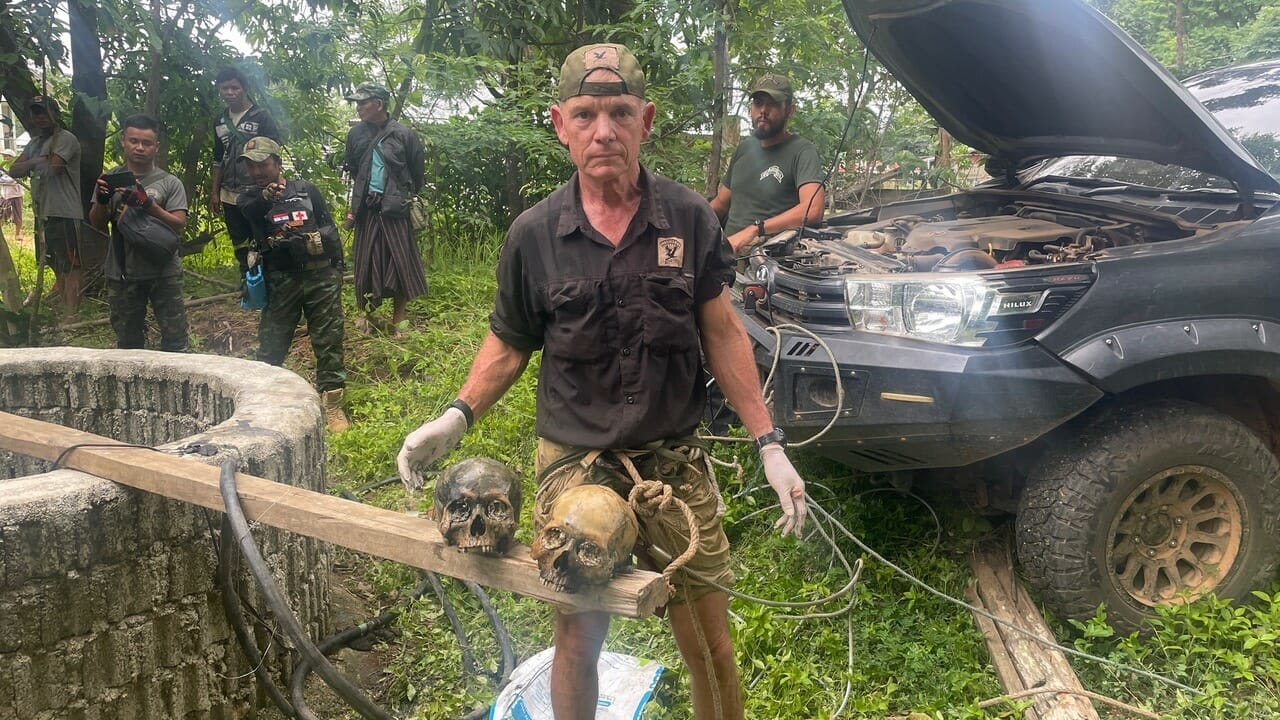
Aided by the local resistance fighters from Karenni Defence Forces, David Eubank retrieved the decomposed heads of KDF fighters beheaded and thrown into a nearby well, Karenni State war zone, Myanmar, February 2023. Photo: David Eubank
The Free Burma Rangers have come to be rooted in the communities of Myanmar’s war zones, and Eubank’s teams of humanitarians have trained thousands of local young women and men, who are minimally literate and driven by the desire and commitment to help their own wretched communities, with or without the help of the United Nations.
Rather counter-productively, the UN, the international system of political states, typically choose to interact with state officials from different line ministries, however criminal and heinous the nature of the state in question may be and however blood-stained the hands of the local representatives are.
In the leaked report (45-pages) of the coup regime’s Ministry of Home Affairs, which contained the detailed minutes of the 7-hr long hybrid (Zoom and in-person) meeting by security chiefs regarding the-ground situation throughout Myanmar, the regime officials stated that the military was providing humanitarian aid to only 200,000+ out of the 1.8 million violence-fleeing refugees (or Internally Displaced Persons or IDPs). And yet the UN agencies were seen signing their MOUs away with the main creators of Myanmar’s humanitarian crisis, amidst the loud calls from Myanmar activists and ethnic resistance organizations for the United Nations and “international donors” to start supporting and cooperating with the community-based resistance organizations towards delivering emergency and humanitarian relief.
To belabour the obvious: The state of Myanmar is very grim
A cursory glance will suffice. There is a staggering amount of violence AGAINST CIVILIANS in Myanmar, committed primarily by the Myanmar coup regime and its troops since the coup of 2021. The economy is in dire situation: a bag of rice costs 100,000 Kyat today (almost US$50), a friend texted me earlier this morning. There is a total absence of human security with 90% of the country sites of armed conflict between people’s resistance forces, numbering hundreds, and the main perpetrators of all human rights and war crimes, namely Myanmar coup troops. With elected political leaders such as Aung San Suu Kyi and her 1st line deputies in the regime’s captivity, the main political party – the National League for Democracy – is imploding over the question of armed revolution versus peaceful change within the military’s anti-democratic 2008 Constitution. The National Unity Government (NUG) largely made up of racist Myanmar exiles is increasingly seen by many as dissident and being incapable of providing any meaningful and effective leadership, strategically or intellectually. There is little or no prospect for the UN and its member states recognizing the NUG as the legitimate representative of the State of Myanmar.
So the statistics and the general picture of Myanmar which Volker Türk – and all his predecessors in Geneva – have presented the Human Rights Council, the Security Council and the General Assembly – are nothing really new. Myanmar is a country that recently was the site of the textbook Lemkinian genocide! But what is really new is the people of Myanmar are now waging resistance, forging organic solidarity across different communities – even while political and resistance elites may be bickering and engaged in internecine petty tussles.
Of course, the UN agencies and careerists within the organization – originally envisaged as the Nations United Against the Evil (of wars and fascisms) – with their fetish for states – not the people – will not see beyond the discourse of (un-enforced) international law and bureaucratic interests. Affairs of the states or world’s regions today offer little ground for hope anywhere, be it the Taiwan Straits, Russia, Ukraine, USA, China, India, France, or post-Brexit Britain, not to mention the climatic health of our planet.
That is why it is so crucial to look at We the People who are actually doing what is humanly possible – not simply making lawyerly oral presentations before life-and-conscience-less bureaucracies on the ground, to resist oppression, offer humanly relief efforts, and build solidarity, and seek collaboration amongst Fanon’s “wretched of the earth”.
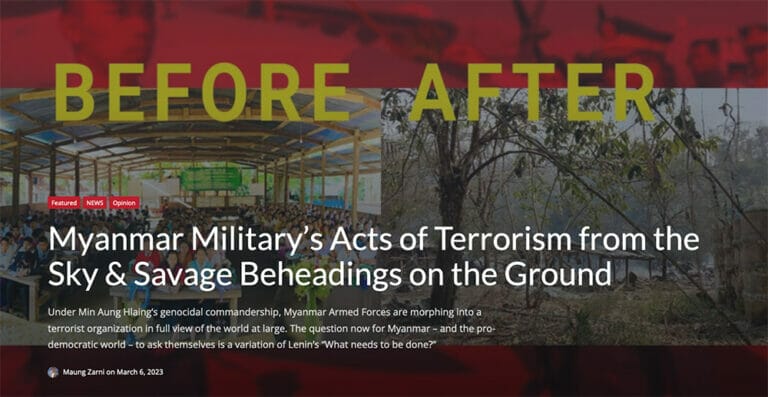 Against this backdrop, David Eubank and the Free Burma Rangers’ service-based movement in Myanmar (and beyond) offers hope and a sense of universal brotherhood and sisterhood, no matter how tough the goings get for the people.
Against this backdrop, David Eubank and the Free Burma Rangers’ service-based movement in Myanmar (and beyond) offers hope and a sense of universal brotherhood and sisterhood, no matter how tough the goings get for the people.
It is We the People and their struggles in Myanmar, irrespective of race, faith or nationality, that need concrete, material and real international support and solidarity. Dismayed at the hyper-hypocrisy of the West, which is pouring billions of $ worth of weapons, munitions, and aid into Ukraine’s resistance against Russia, the great humanitarian calls for the western world’s solidarity and material support to Myanmar’s courageous resistance.
Maung Zarni

